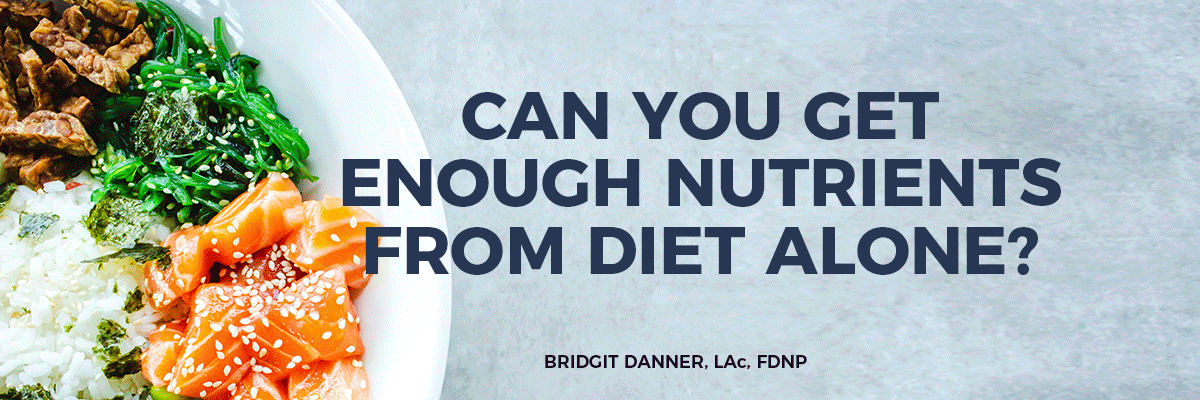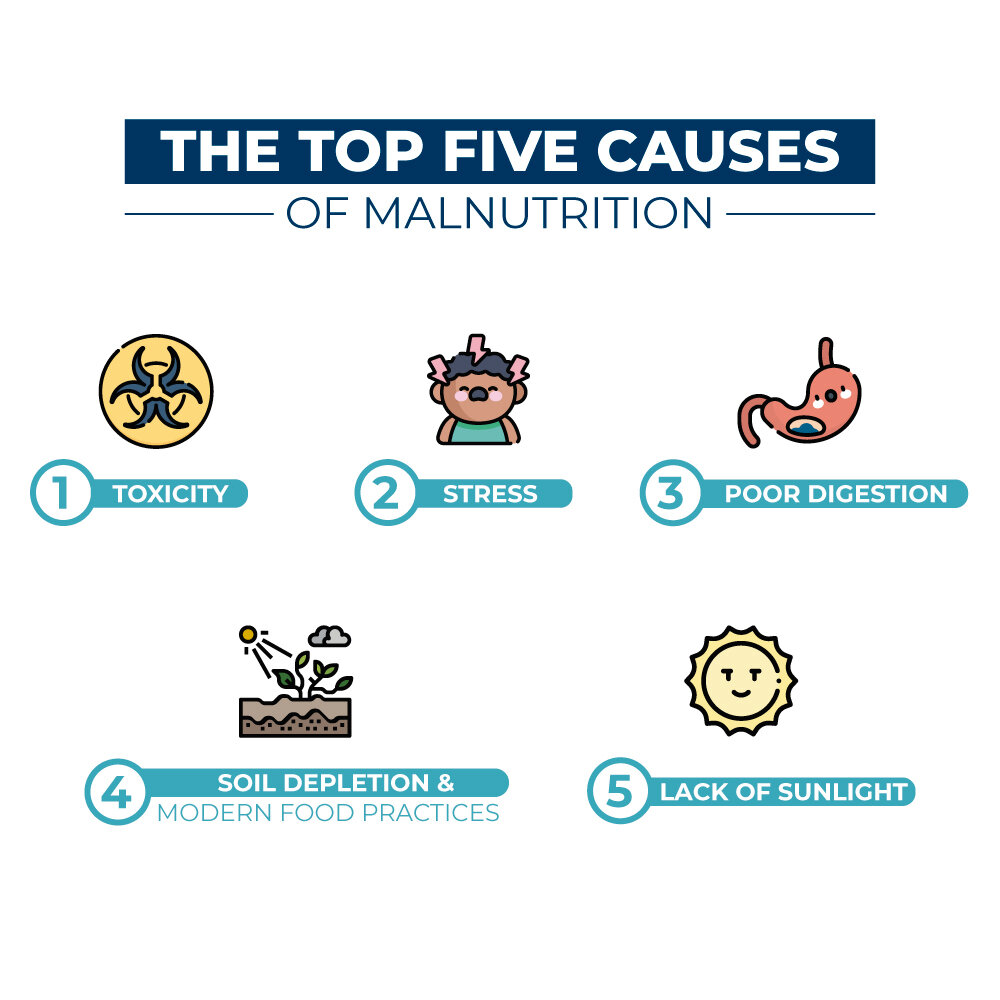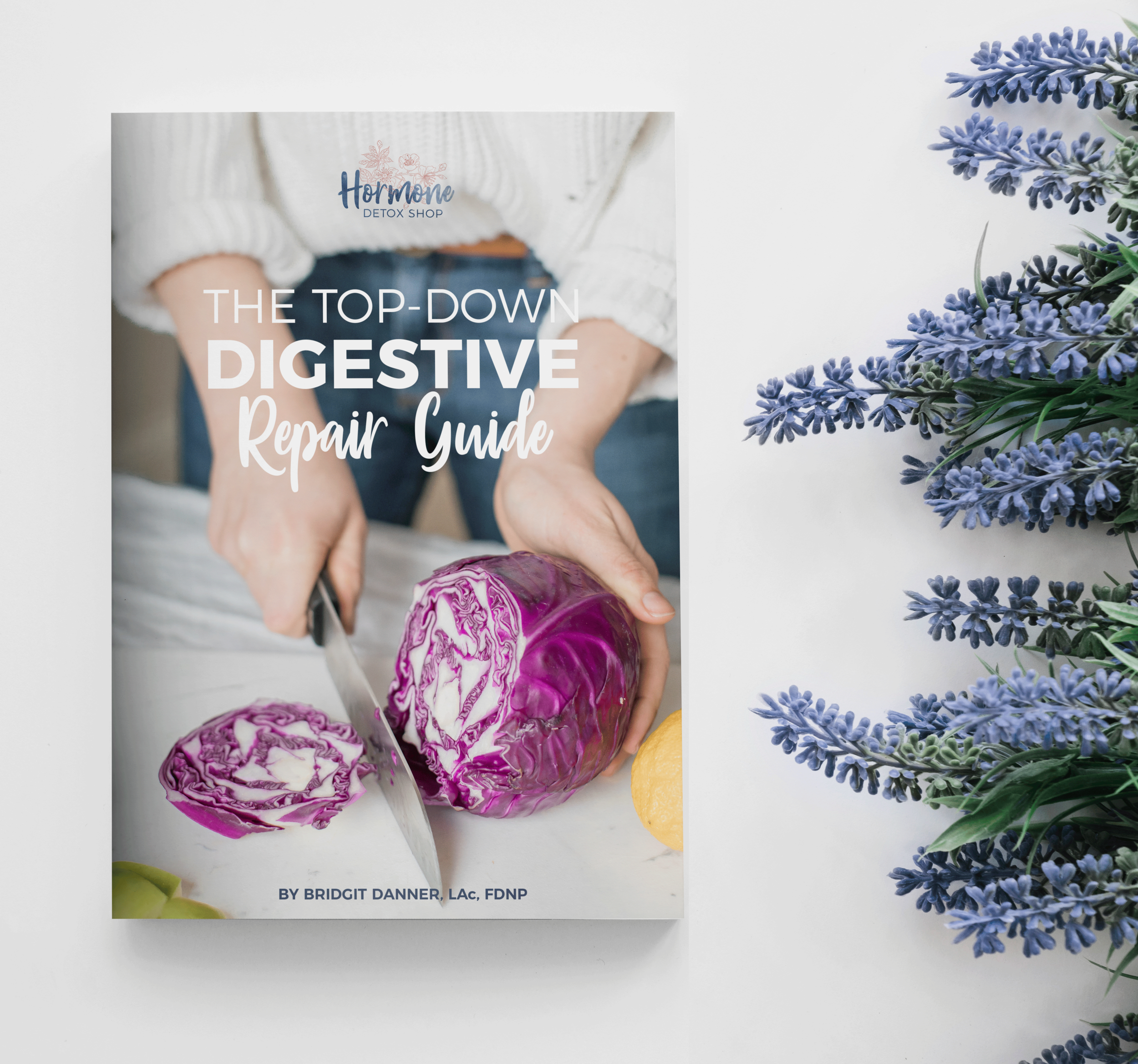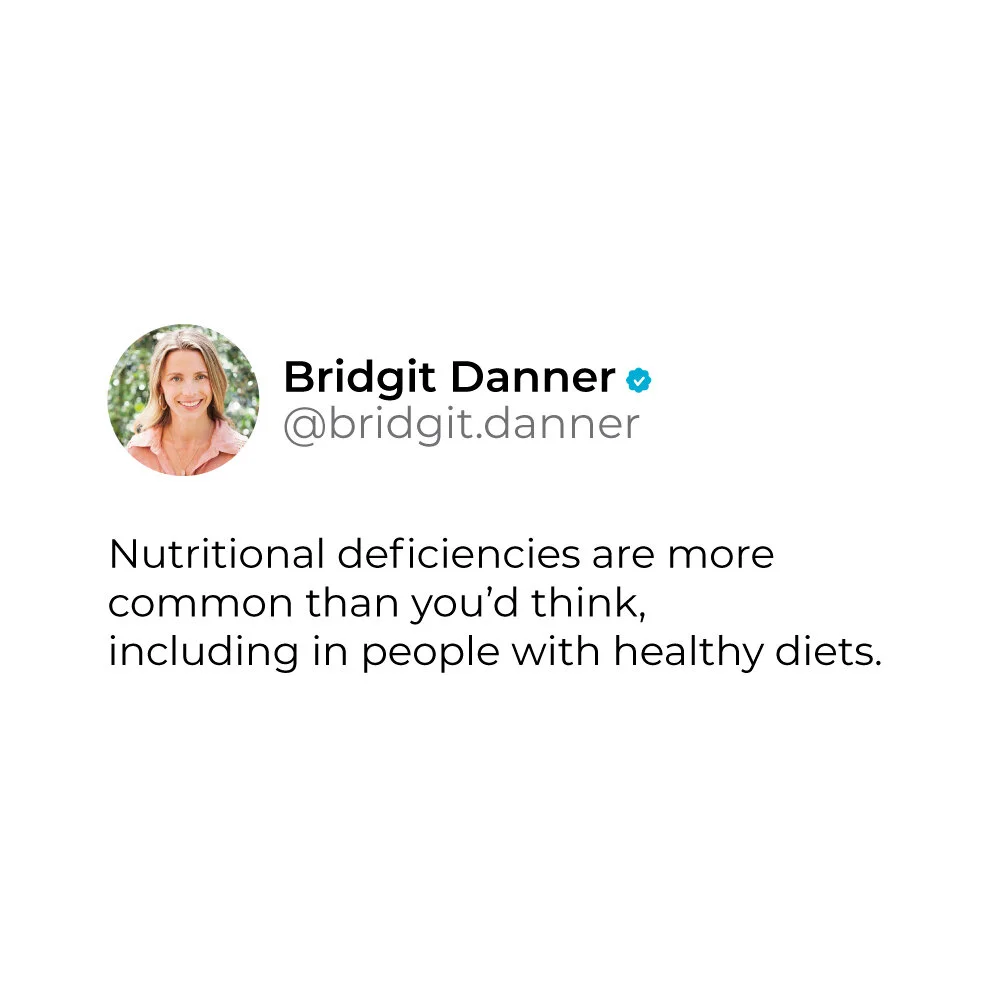Can You Get Enough Nutrients from Diet Alone?
Can you get enough nutrition from diet alone? This is a hotly debated question and most people have an opinion! I have been in the health field since 2000 and I have a strong opinion too. You cannot get adequate daily nutrition from diet alone.
My medical opinion is based on research from various fields. In this article, I’ll explain how I came to this conclusion, and the daily essential vitamins I take to ward off nutritional deficiencies.
The Top Five Causes of Malnutrition
Toxicity
Since I’m a detox-passionate person, I’ll start with toxicity! You might be thinking, what do toxins have to do with my diet?
A. Toxins in Your Food.
You may be ingesting more toxins than you think when you eat. An obvious source of toxins in your diet include:
Preservatives
Pesticides and herbicides (3)
Highly-processed fats (4)
Highly-processed grains (5)
Corn syrups
These ‘ingredients’ can interrupt nutrition in various ways, including:
Creating inflammation at the cellular level
Spiking blood sugar
Creating insulin resistance
Reducing ATP cellular energy (8)
Cytotoxicity (9)
DNA fragmentation (10)
Damaging the microbiome (11)
Risking fatty liver disease
Creating a higher demand for nutrients (12)
Decreasing available amount of nutrients
Of course, you can improve all of this by improving your diet. You can avoid processed foods, choose organic and eat foods high in magnesium and vitamin-B-rich foods.
However, even a whole foods diet can have its limits. In our practice, we run tests for iron, B vitamins, the master antioxidant glutathione, some environmental toxins and even the herbicide glyphosate.
I have seen, time and again, my ‘healthy’ clients still have vitamin B deficiency, high levels of toxins and even high glyphosate. How could this be in a person who is choosing organic and cooking her own foods?
Like everything in functional medicine, it’s complicated...but 100% worth understanding! Keep reading and notice the potential triggers in your own health and lifestyle.
B. Toxins in Your Environment (Household and Workplace)
Beyond toxic food, toxins at work and home can actually hamper your best nutrition. Your environment is affecting you in invisible ways you may not realize. For brevity, I’ll gives just a few examples here:
Toxic Mold: Toxic mold is a potential major disrupter of the gut and thyroid, which can lead to poor nutrient absorption. (13) Toxic mold also zaps cellular energy and chronically stresses the body, creating an increased demand for things like glutathione, CoQ10 and B vitamins. (14)
Chlorine, Bromine and Fluorine: “Halogens are a family of non-metal elements on the periodic table that share similar chemical properties. Three of these halogens are toxic to your body (chlorine, bromine and fluorine). Another halogen is iodine, which is the only halogen that the human body needs. Fluoride, chlorine and bromine are toxic in themselves, but are also highly detrimental because they tend to block your body’s iodine receptors, and therefore prevent your body from absorbing the Iodine it needs.” (15)
“Just like other halogens, fluoride has been proven to act as a trigger in inducing thyroid cell death, as well as lead to the development of thyroid inflammation and autoimmune thyroid disease like Hashimoto’s.” (16)
As the thyroid plays such an important role in digestion and metabolism, toxic affronts to the thyroid gland may result in nutrient deficiencies.
Fragrances: I love to harp on fragrance--an ever present cocktail of chemicals that contains endocrine-disrupting chemicals and obesogens (chemicals that can alter your weight, hunger and fat cell composition.) They can lower your thyroid function, as described above. (17)
2. Stress
Stress is that ever present thing that we should accept as part of life, right?! Yes and no. Even if you have a lot of gratitude and good fortune, you will have times of stress. And even with this busy world we all live in, you can reduce the amount of stimulation and stress you experience.
It’s important to know different stress management techniques, to know your own limits, and to create ‘quiet times’ in your life.
It’s also important to know how stress affects you nutritionally!
Magnesium: If you read a lot of my work, you know that I am crazy about magnesium. It’s such a common deficiency and also such an important nutrient. (18) Magnesium is needed to manage anxiety, sleep and more, but it’s depleted in times of stress. (19)
Niacin, zinc, calcium and iron: These have also been shown to be reduced during stress. (20) Among the stressors, cold exposure really affected niacin. (21) (Thank goodness I live in Arizona.)
Vitamins C and E, Omega 3s and other antioxidants: These also suffer depletion during times of stress. (22)
3. Poor Digestion
You are not just what you eat, but what you digest. Our Top Down Digestion Guide details for you all the reasons you may not digest well, from the brain down.
A low metabolic rate, determined by your thyroid gland, can reduce stomach acid production. Your thyroid likes a low-tox environment, a clean liver and a healthy gut.
Your cells can get low energy too, thanks to toxins like mycotoxins from mold, and then digestion can slow. Head injuries are another way that digestion can suddenly switch off.
Typical causes of maldigestion are:
Slowed bowel movement
Dysbiosis
Gut infections
Low enzyme production
Reduced blood or lymphatic flow
Imparied lipid digestion
Inflammation of the brush border
Inhibited mechanical digestion
Vagal nerve disturbance
Mucosal barrier issues (23)
Digestion generally weakens with age as well. If you felt you could ‘eat anything’ when you were younger, and now you can’t, you are noticing some natural changes.
BUT I firmly believe that you can support great digestion as you age. Simple things like chewing well and eating in a relaxed environment helps. I also love bitter greens, bitter tinctures, and digestive enzymes.
4. Soil Depletion & Modern Food Practices
There is an assumption that when you eat real food you are getting a lot of nutrition. But factors such as soil nutrient depletion, food storage time and food travel time deplete food nutrition. One study found drops in nutrition of 14-37% from 1975 to 1997. (24)
Declining soil nutrition can also allow toxic elements like arsenic to increase. (25)
Finally, please consider how far away your food has traveled and how long it’s been sitting in your fridge. Eating food that’s from close to home quickly is a great idea! Cooking methods can factor in too. Cooking with fats can preserve fat-soluble nutrients. Boiling vegetables and tossing the water can deplete nutrients. (26)
5. Lack of Sunlight
One side effect of too much time indoors and too much sunscreen is a lack of sunlight and subsequent vitamin D deficiency. Vitamin D absorption is also hampered by obesity, inflammation, dark skin tone and farther latitudes from the equator. (27)
Vitamin D has been in the spotlight lately as low levels are associated with COVID severity. (28)
Vitamin D is critically important for many processes in the body as you’ll learn about below. Unfortunately, your local climate alone can be a major problem in your vitamin D status, so I always recommend supplementing with vitamin D, but also testing to know your levels first.
___
Okay, how am I doing at making my case? (; Next let’s look at how fricking important nutrition is to you, and that may drive home the true need to shore up your nutrition with supplementation.
Nutrients You Need Each Day
Micronutrients are things like vit A, the B vitamins, chromium, zinc, etc. They are either water soluble or fat soluble. Fat soluble vitamins can be stored, and water soluble cannot.
So, while both are important, it’s particularly important to consume water soluble vitamins every day!
Macronutrients include fats, carbohydrates and proteins. Depending on your dietary camp, you may be experimenting with the ratio of these items, which is mostly fine as long as you get your micronutrients and get enough fats and protein.
I love the work of Jayson and Mira Calton, authors of Naked Calories and The Micronutrient Miracle. In their opinion, any diet is a good diet if it provides the right levels of micronutrients. However, the problem is that there really is no diet that provides them all!
The Caltons have assessed several popular diets and found them unable to produce the RDA of all micronutrients.
For the most part, you will instinctually get a variety of macronutrients, but I do see many women not get enough protein, which is a building block to hormones.
Among my audience of health-aware, clean-eating folks, I still see Omega 3 fatty acid deficiency and an imbalance Omega 6:3 ratio. (30)
Clean, wild fish is a high-dollar item these days, and sometimes hard to find. And you may be confused about which fish is safe (as far as toxins), so you just avoid it all. Or you may not have grown up eating seafood and just don’t like it. Whatever the reason, Omega 3s are still critical to good health!
Omega Concentrate
In functional medicine, we work with root causes of dis-ease and supporting body systems. Nutritional deficiencies are more common than you’d think, including in people with healthy diets.
As I mentioned above, a shortage of Omega 3 is common. Possible signs and symptoms of FADS (Fatty Acid Deficiency Syndrome) include:
Dry skin
Poor concentration
Chronic pain/sore joints
Allergies & asthma
Mood changes
Dry mouth
Brittle hair and nails
Frequent urination (31)
Testing for fatty acid levels is possible but not common. Optimal blood levels and oral dosages are not well defined. But here are a few guidelines:
“Based on evidence that erythrocyte EPA + DHA composition of ≤4 % of total fatty acid composition increases risk for sudden cardiac death, erythrocyte or whole blood EPA + DHA composition of ≤4 % may be considered to be a ‘state of deficiency’ that requires corrective intervention.” (32)
“The American Heart Association also recommends 3 g/d EPA + DHA for reducing elevated triglyceride levels.” (32)
“In relatively recent times multiple studies have confirmed this observation. Large studies such as the Swedish Mammography cohort of 36,234 women followed for 8 years suggest moderate consumption of fatty fish is associated with a lower risk for heart failure hospitalization.” (33)
“Probably the first report of fish consumption as a medical therapy is found in the Old Testament book of Tobias, “Then the angel said to him: Take out the entrails of the fish, and lay up his heart, and his gall, and his liver for thee; for these are necessary for useful medicines.” (33)
“Recent development of a population range in a United States population helps to provide clinical guidance since population omega-3 blood level ranges may vary due to environmental and genetic reasons. Omega-3 supplementation may also be of benefit in reducing the adverse impact of air pollution on COVID risk.” (33)
Many fish oil clinical trials have used a dose of 1 g/d in all treated subjects. The dose of 1 g/d of EPA, has been reported to increase the total EPA + DHA blood levels from a mean of 3.6 % to 5.4 % but approximately 16 % of the subjects achieved an EPA + DHA blood level less than 4.8 % [17]. This is clinically relevant since it has been noted that an EPA + DHA blood level > 5 % is the range in which a dramatic reduction in sudden coronary death reduction can be observed. (34)
The current Recommended Daily Allowance of Omega 3 is 1.1 - 1.6 gm/ day. Our new Omega Concentrate is 1.6 gm of equal parts EPA and DHA in 2 softgels.
DHA is essential for brain health and EPA is essential for reducing inflammation in the digestive tract. (35) So both are really important! I recommend 2 softgels of our Omega Concentrate daily.
Daily Multivitamin
A daily multivitamin may seem really uninteresting. I meet many new clients who are taking this, that, and the other ‘specialty’ supplements, but are missing this vital building block.
There are also biohackers that argue that you should not take a multivitamin because you don’t know your own vitamin status, and you need to check that first.
But checking that is an expensive moving target. And, as I said earlier, many vitamins are water-soluble, and you can’t store them to toxic levels. For fat-soluble vitamins, you just want to be careful not to overdo the dosage too much.
I am a big fan of a daily multivitamin that I created our own: Hi-Potency Multivitamin. This unsung hero, when it’s high quality, can boost so many systems.
Chromium will help manage your sugar cravings.
Zinc helps manage acne and PMS and promotes immune function. (36)
Your B vitamins support detoxification and hormone production. (37)
B vitamin benefits include stress-handling & supporting the blood-brain barrier. (38, 39, 40)
A multivitamin can increase energy and improve cognitive function. (41)
I am pretty consistent about taking my omegas, multi, and magnesium. But one month a couple of years ago I decided to just stop. That month my cycle was so horrible! I had sore joints, cramps, and PMS. I learned my lesson on the importance of these daily nutrients.
I’m so proud of our new Hi-Potency Multivitamin! All ingredients are very clean and absorbable and are MTHFR-friendly. It’s a dose of just two per day and one bottle lasts a month.
Daily Magnesium
I have asked many a client, “Do you take magnesium?” and the most frequent answer I get is, “Well, I take a multi, isn’t it in there?” Yes...but not nearly enough!
There may be a tiny bit of magnesium in your multivitamin, but magnesium is just too bulky for there to be a significant dose of it.
Eating a few foods high in magnesium won’t cut it. Thanks to stress, soil depletion, heavy metals, and other things we covered above, you are likely magnesium deficient. This important mineral supports over 300 processes in the body, and you may feel its absence through:
Anxiety
Insomnia
Pain
Headaches
Constipation
Muscle twitches
Sugar cravings
I recommend 300-600 mg/day and I prefer it in the form of magnesium glycinate chelate, a type that is more to feed the cells than move your bowels. I also prefer it as a powder to increase absorption. Our Chelated Magnesium Powder has been a top-seller for 2 years and is now part of our Daily Essentials Kit.
You can take it straight in water or experiment with adding a squeezed lemon or apple cider vinegar. (42)
Magnesium benefits include:
Reduce inflammation in the body
Lowered cortisol levels
Increase insulin sensitivity
So it’s a major ally if you are stressed and gaining weight! (43, 44)
Our new Chelated Magnesium Capsules are blended with magnesium oxide which creates a synergy for superior absorption and a refreshingly small capsule size!
Ready to Try for Yourself?
The best way I've found to combat the low nutrient levels in our diets is to add some targeted supplementation.
Our foundations collection is a high-quality investment in your everyday health!
We’ve done the research so you don’t have to; these supplements do what they are meant to do- absorb into your cells so your body systems can run smoothly and you can feel great!
P.S. Want to hear my recent presentation on how to get the best nutrients? Watch below!
Bridgit Danner, LAc, FDNP, is an acupuncturist turned functional health coach and has worked with thousands of clients since 2004.
She is the founder of FunctionalDetoxProducts.com and the author of The Ultimate Guide to Toxic Mold Recovery: Take Back Your Home Health & Life, available in audiobook, Kindle and paperback on Amazon.





















I was introduced to CoQ10 as an supplement about 4 years ago. At the time, I was in the middle of detoxing from mold, and I had already spent a lot of money on trying to heal. I was skeptical to try yet another thing, but the truth was that I was only about 50% better, which is not enough at all. So I tried it…